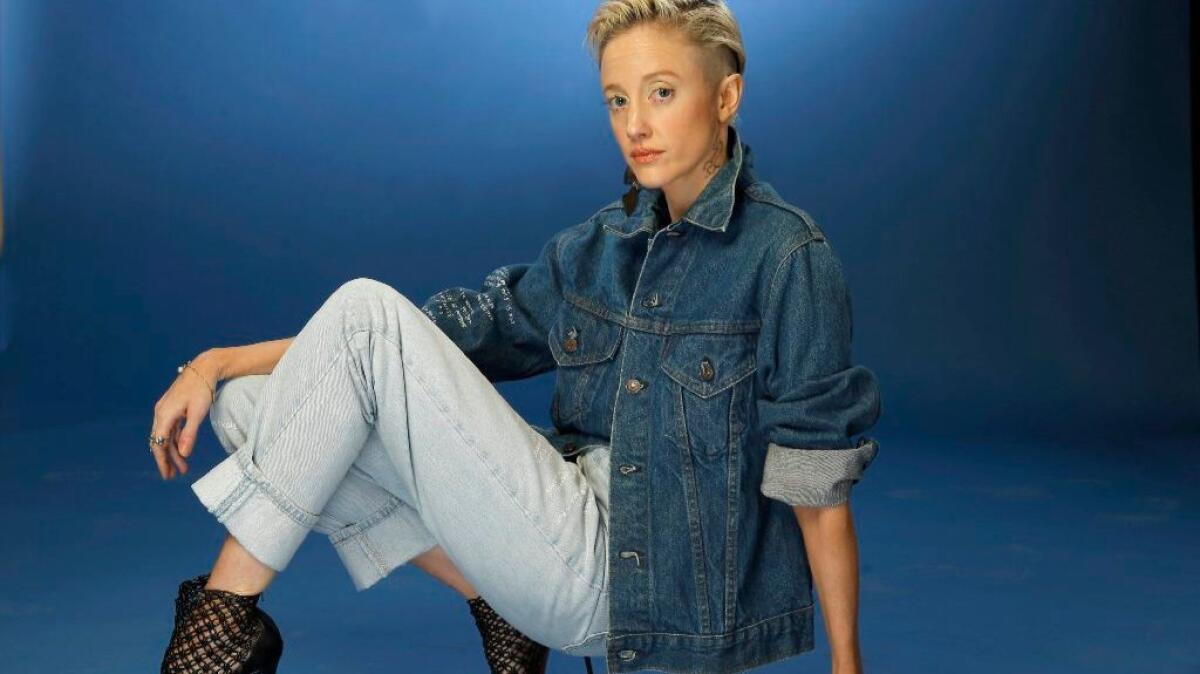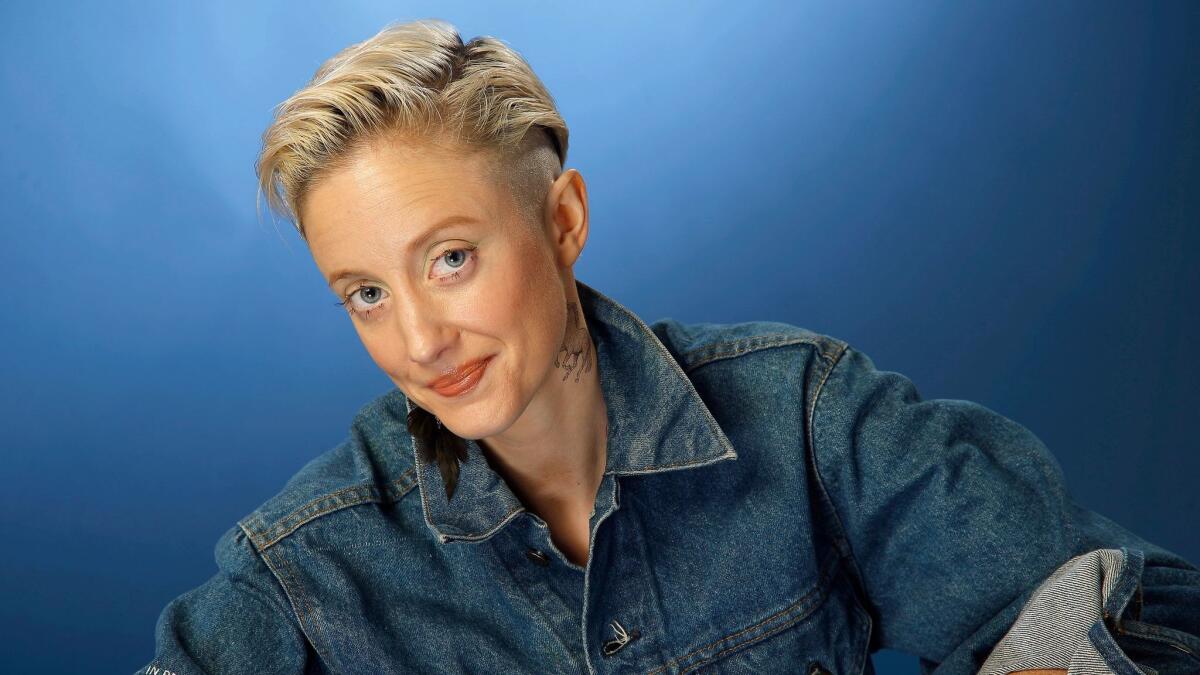As Billie Jean King’s lover, Andrea Riseborough wanted to embody the free spiritedness of the era

- Share via
It isn’t necessarily reflective of the roles she’s played to date, but Andrea Riseborough says she’s always been “quite politicized.” In fact, CNN was running in the background blasting whatever breaking news was occurring on the hour during our mid-morning conversation a few weeks ago. That being said, the British actress didn’t expect a film she shot a year ago to be so politically relevant in today’s current political climate.
In “Battle of the Sexes,” Riseborough plays Marilyn Barnett, the former hairdresser and, arguably, first love of legendary tennis player and social activist Billie Jean King (Emma Stone). Barnett was King’s first female lover and by her side during her infamous 1973 tennis match against Bobby Riggs (Steve Carell). While women around the world cheered on a King victory as a historic moment for gender equality, King was coming to terms with her feelings for Barnett. The events in the film took place over 40 years ago, but they resonate strongly today in what many are calling the “year of the woman.”
“Billie Jean’s story is such an important one,” Riseborough says. “And I just kind of felt disbelief about not having really learned about any [of it as it was an] influential step in the right direction towards the legislation of equal pay.”
What captured my interest was that they so wanted to explore this love story between Billie Jean and Marilyn.
— Andrea Riseborough
After meeting with directors Jonathan Dayton and Valerie Faris, she was immediately taken by how much compassion the filmmakers had for all the people involved. She notes, “What captured my interest was that they so wanted to explore this love story between Billie Jean and Marilyn.”
Little is actually known about Barnett’s life beyond the fact she was a hairdresser when she met King and in 1981 she filed a palimony lawsuit, which effectively outed King as a lesbian to the general public (a topic not covered in the film). She passed away some years ago, and Riseborough says researching her was a little bit like “chasing a ghost.” Moreover, while King was helpful, it was understood a long conversation about Barnett was highly unlikely.
“Their relationship ended in a really difficult way. And Billie’s life was subject to so much scrutiny. She lost all of her endorsements overnight and she really went through hell years after [the time period of] this film. It’s a very delicate subject,” Riseborough says. “Marilyn’s passed away and we know they were very much in love. So, no, she certainly wasn’t all that interested in telling jolly anecdotes, or anything like that. It was all kinda just talking about the time.”

WATCH: Video Q&A’s from this season’s hottest contenders »
Without much to go on, Riseborough says she wanted her portrayal of Barnett to embody the liberation, free spirit, and hope of the early ‘70s. Riseborough adds, “She’s just in a pressure cooker. A time when women can’t get their own bank account without being co-signed by their husbands. I wanted Marilyn to be that hope.”
From Riseborough’s perspective, Barnett also served a unique purpose in Simon Beaufoy’s script. Not only was she the first person King could truly explore her sexuality with, but she was also a necessary distraction from the pressure of being the world’s No. 1 women’s tennis player at the time.
“I’m putting it into my own words, ‘Marilyn was the catalyst for Billie Jean to use her body as something other than just a machine’ because it was such for a championship,” Riseborough says. “It was like a stallion body. And that’s not to say that she hadn’t enjoyed sex or that she hadn’t had a wonderful sex life with [her husband] Larry, because she did, actually. And Billie is very adamant about that. But there was a new sensuality that was awoken when Marilyn came into Billie’s life. And that really touched me.”
That sensuality needed to be apparent from the first time they meet while Barnett is styling King’s hair. The filmmakers repeatedly played “Changing Opinion” by Philip Glass as inspiration, but as Riseborough notes, “There’s no preparation you can do to be present in a scene.” Although it helped that Stone and Riseborough had worked together previously on “Birdman.”
“It’s so tantalizing in the beginning. There was so much opportunity for those very first moments of falling in love,” Riseborough says. “You almost can’t really articulate them because they’re so special. And I think the great job that Jon and Val did was that they almost fragmented the scene. It looks likes pieces of glass. It’s really tantalizing the way that they shot what was happening between Emma and I. And to me, you feel like you can’t quite get to it, but you really want to be closer to them. But you’re also inside of it. It’s a really beautiful, rhythmic feeling.”
More to Read
From the Oscars to the Emmys.
Get the Envelope newsletter for exclusive awards season coverage, behind-the-scenes stories from the Envelope podcast and columnist Glenn Whipp’s must-read analysis.
You may occasionally receive promotional content from the Los Angeles Times.










